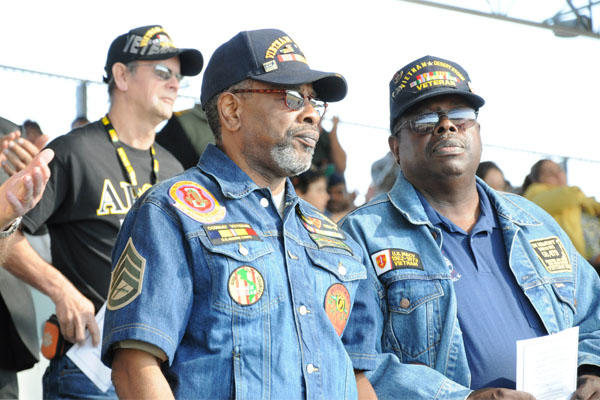The Veterans Affairs Department would be funded to nearly $169 billion next year under the budget proposed by the White House on Monday, but a plan to redirect some of the $15 billion appropriated to VA last year under the Veterans Choice Act already is drawing fire from Congress.
VA Secretary Bob McDonald said the 2016 budget "will allow us to continue important progress to better serve veterans, their families and their survivors. We are listening to what veterans, Congress, employees, veterans' service organizations and other stakeholders are telling us."
"We aspire to make VA a model agency that is held up as an example for other government agencies to follow with respect to customer experience, efficient and effective operations, and taxpayer stewardship," McDonald said.
As always, the lion's share of the budget – in this case $95 billion – is for mandatory programs such as disability compensation and pensions, leaving about $73.5 billion in discretionary spending. Of that, the VA is asking for just over $63 billion for healthcare.
President Obama, in releasing his own message on the budget Monday -- including the VA's – said his administration "will submit legislation to reallocate a portion of the Veterans Choice program funding to support essential investments in VA system priorities."
VA Assistant Secretary for Management Helen Tierney told reporters Monday afternoon that veteran interest in a key provision of the Choice Act - being able to go outside VA for health care - "has not been as high as anticipated."
The provision was aimed at helping veterans who face long wait times for appointments, or who live far away from a VA medical facility.
"We hear directly from veterans and their representatives that they would prefer to get their care at VA facilities, from medical professionals they know and with whom they have relationships," said Tierney, who is VA's chief financial officer. She said the VA won't be asking for more money than it already has, just the ability to transfer funds from where they may not be needed as part of the Choice Act to where they will be needed in providing care at VA facilities.
"This transfer authority is essential to ensuring we have the right resources to meet veterans' needs, she said.
Tierney did not know how much has been spent so far on the Choice program, nor how many veterans are actually using it, though some 8.6 million Choice cards have been sent out.
Rep. Jeff Miller, R-Florida, said that idea is "a complete non-starter."
"When a near-unanimous Congress worked with President Obama last year to create the Choice program, we made a promise to veterans to give them more freedom in their health care decisions. I will not stand idly by while the president attempts to renege on that promise," Miller said.
Overall, the 2016 discretionary budget request of $73.5 billion is $5.2 billion more than 2015, or nearly 8 percent higher.
McDonald said in his budget message that the VA is serving about 9.4 million veterans, of which some 1.4 million are vets who served in the wars in Afghanistan and Iraq.
Within the $63.2 billion health care request, it is asking for $7.5 billion for mental health services; $2.8 billion for prosthetics; $556 million for spinal cord injuries; $232 for traumatic brain injuries; $243 million for readjustment counseling and $7.5 billion for long-term care.
The budget also includes requests to expand various programs. These include $1.2 billion for telehealth, the VA's ambitious program that enables VA healthcare providers to monitor and service the health of veterans remotely, including in rural areas.
The budget also requests $446 million for health care services specific to female veterans, an increase of 8.3 percent over current funding.
Though VA construction accounts for 2 percent of the discretionary budget, a series of projects that fell behind schedule and saw millions in cost overruns prompted the VA to ask for $1.14 billion in construction for 2016. That's nearly double its 2015 appropriation.
It also asks for nearly $600 million for start-up costs for new and enhanced health care facilities.
In addition to health care, the VA is asking for $4.1 billion to continue developing its information technology programs, $2.7 billion for the Veterans Benefits Administration and $1.14 billion for construction.
-- Bryant Jordan can be reached at bryant.jordan@military.com


























